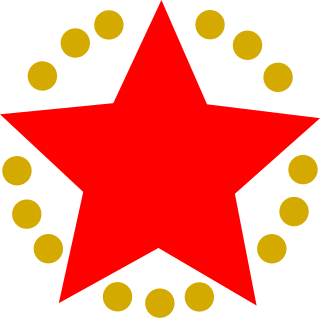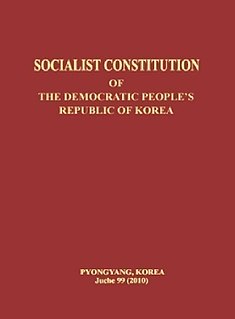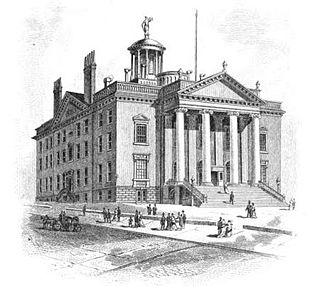
The Supreme Soviet of the Union of Soviet Socialist Republics was the most authoritative legislative body of the Union of Soviet Socialist Republics (USSR) beginning 1936, and the only one with the power to approve constitutional amendments. Prior to 1936, the Congress of Soviets was the supreme legislative body. During 1989–1991 a similar, but not identical structure was the supreme legislative body. The Supreme Soviet elected the USSR's collective head of state, the Presidium; and appointed the Council of Ministers; the Supreme Court; and the Procurator General of the USSR.

Pak Pong-ju is a North Korean politician who served as Premier of North Korea from 2003 until 2007, and again from 2013 until 2019. He was elected a member of the Presidium of the Workers' Party of Korea (WPK) in 2016.

The Supreme People's Assembly is the unicameral legislature of the Democratic People's Republic of Korea (DPRK), commonly known as North Korea. It consists of one deputy from each of the DPRK's 687 constituencies, elected to five-year terms.

The National Assembly, is the general representative body of Slovenia. According to the Constitution of Slovenia and the Constitutional Court of Slovenia, it is the major part of the distinctively incompletely bicameral Slovenian Parliament, the legislative branch of the Republic of Slovenia. It has 90 members, elected for a four-year term. 88 members are elected using the party-list proportional representation system and the remaining two, using the Borda count, by the Hungarian and Italian-speaking ethnic minorities, who have an absolute veto in matters concerning their ethnic groups.

Elections in North Korea are held every four-to-five years for the Supreme People's Assembly (SPA), the country's national legislature, and every four years for Local People's Assemblies.

The International Law Commission (ILC) is a body of experts responsible for helping develop and codify international law. It is composed of 34 individuals recognized for their expertise and qualifications in international law, who are elected by the United Nations General Assembly (UNGA) every five years.

The Socialist Constitution of the Democratic People's Republic of Korea is the constitution of North Korea. It was approved by the 6th Supreme People's Assembly at its first session on 27 December 1972, and has been amended and supplemented in 1998, 2009, 2012, 2013, 2016 and twice in 2019. It replaced the country's first constitution which was approved in 1948.

The President of the State Affairs Commission of the Democratic People's Republic of Korea, previously referred to as the Chairman of the State Affairs of the Democratic People's Republic of Korea, is the head of state of North Korea. The President heads the State Affairs Commission (SAC), which is the highest leadership institution in North Korea, and serves as the commander-in-chief of the North Korean armed forces.

The National Defence Commission of the Democratic People's Republic of Korea (NDC) was the highest state institution for military and national defence leadership in North Korea, which also served as the highest governing institution of the country from 1998 until 2016 when it was replaced by the State Affairs Commission.

Parliamentary elections were held in North Korea on 22 April 1990. 687 deputies were elected to the ninth Supreme People's Assembly. The first session was on May 24–26, 1990. Of the 687 deputies, workers accounted for 37 percent, farmers 10.4 percent, and women 20.1 percent. The Korean Social Democratic Party held 7.4 percent and the Chondoist Chongu Party held 3.2 percent of the seats, with the two parties together holding 10.6 percent of the seats. The Workers' Party of Korea retained 83 percent of seats. Among the 687 seats which constitute the SPA at that time, 601 seats were allocated to the Workers' Party of Korea, 51 seats were allocated to the Korean Social Democratic Party representing 7.4 percent of the whole, 22 seats were allocated to the Chondoist Chongu Party representing 3.2 percent of them and the "independent" deputies were given 13 seats . Deputies whose ages were below 35 represented a rate of 2.9 percent. Those who were between 36 and 55 represented a rate of 56.8 percent, and those who were over 55 represented a rate of 40.3 percent. Among those elected were Kim Il-sung and Kim Jong-il.

The 84th New York State Legislature, consisting of the New York State Senate and the New York State Assembly, met from January 1 to April 16, 1861, during the third year of Edwin D. Morgan's governorship, in Albany.

The 95th New York State Legislature, consisting of the New York State Senate and the New York State Assembly, met from January 2 to May 14, 1872, during the fourth year of John T. Hoffman's governorship, in Albany.

The 128th New York State Legislature, consisting of the New York State Senate and the New York State Assembly, met from January 4 to July 20, 1905, during the first year of Frank W. Higgins's governorship, in Albany.

The 6th Central Committee of the Workers' Party of Korea was elected by the 6th Congress on 14 October 1980, and remained in session until the election of the 7th Central Committee on 9 May 2016. The Central Committee composition was replenished by the 3rd WPK Conference. In between party congresses and specially convened conferences the Central Committee is the highest decision-making institution in the WPK and North Korea. The Central Committee is not a permanent institution and delegates day-to-day work to elected bodies, such as the Presidium, the Politburo, the Secretariat, the Central Military Commission and the Control Commission in the case of the 6th Central Committee. It convenes meetings, known as "Plenary Session of the [term] Central Committee", to discuss major policies. Only full members have the right to vote, but if a full member cannot attend a plenary session, the person's spot is taken over by an alternate. Plenary session can also be attended by non-members, such meetings are known as "Enlarged Plenary Session", to participate in the committee's discussions.

The State Affairs Commission of the Democratic People's Republic of Korea (SAC) is defined by the 2016 constitution as "the supreme policy-oriented leadership body of State power." The current chairman of the SAC, which is defined by the same constitution as the supreme leader of the nation, is Kim Jong-un.

The 12th Presidium of the Supreme People's Assembly (SPA) was elected by the 1st Session of the 12th Supreme People's Assembly on 9 April 2009. It was replaced on 9 April 2014 by the 13th SPA Presidium.

The 10th National Defence Commission (NDC) of North Korea was elected by the 1st Session of the 10th Supreme People's Assembly on 5 September 1998. It was replaced on 3 September 2003 by the 11th NDC.

The 11th National Defence Commission (NDC) of North Korea was elected by the 1st Session of the 11th Supreme People's Assembly on 3 September 2003. It was replaced on 9 April 2009 by the 12th NDC.

The 12th National Defence Commission (NDC) of North Korea was elected by the 1st Session of the 12th Supreme People's Assembly on 9 April 2009. It was replaced on 9 April 2014 by the 13th NDC.

The 13th National Defence Commission (NDC) of North Korea was elected by the 1st Session of the 13th Supreme People's Assembly on 9 April 2014. It was replaced on 29 June 2016 by the 13th State Affairs Commission.










